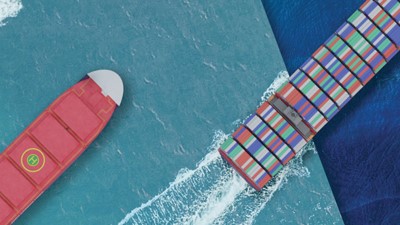The American Bureau of Shipping (ABS) has released a new report Pathways to a Low Carbon Future LNG Carrier Nuclear Ship Concept Design to address challenges to nuclear technology at sea. The 14-page report looks at the potential of advanced nuclear technology for maritime applications, with a study of a small modular reactor (SMR) on a standard liquefied natural gas (LNG) carrier.
The transformational impact of a high-temperature, gas-cooled reactor (HTGR) on the design, operation and emissions of a 145,000 cubic metre LNG carrier design was modelled by ABS and Herbert Engineering Corporation (HEC). ABS says the study is designed to help industry better understand the feasibility and safety implications of nuclear propulsion and to support future development projects.
It provides information on heat and energy management, shielding, weight distribution, and other design features for an LNG carrier with nuclear propulsion. “This will assist the identification of design issues that will inform future Rules development,” ABS notes. The study also found the HTGR technology allowed faster transit speeds and offers zero-emission operations. There would also be no requirement to refuel, although the HTGR technology would need replacing approximately every six years.
The study shows a nuclear propelled LNG carrier would have specific design features, with reactors placed at the rear of the vessel and batteries forward of the location occupied by fuel tanks on current vessels and a reinforced hull. Given design constraints, the HTGR technology would only be suitable for larger LNG carriers.
Earlier in October, ABS launched the industry’s first comprehensive rules for floating nuclear power plants at a forum for nuclear industry leaders held jointly with Idaho National Laboratory (INL). In 2021, the US Department of Energy (DOE) has awarded ABS a contract to research barriers to the adoption of advanced nuclear propulsion on commercial vessels.
Tags: ABS, LNG Carrier, Nuclear



Recent Posts
Scandlines Nears Delivery of Zero Emissions Ferry Following Successful Sea Trials
India faces emission roadblocks with rising net-zero demands
Green Energy Resources invests in two electric Liebherr LHM 550
NYK Launches Continuous Use of Bio LNG Fuel on Car Carriers to Advance Decarbonization Goals
Yang Ming Expands Fleet with Methanol and LNG Dual-Fuel Vessels Under Fleet Optimization Plan
ClassNK Advocates Speed Gap Monitoring to Optimize Fuel Efficiency in Heavy Weather
Wärtsilä’s retrofit package for the Corsica Linea ferry Pascal Paoli has resulted in fuel savings of up to 22 percent Corsica Linea
COSCO Shipping Names Second Methanol Dual-Fuel Containership in Yangzhou